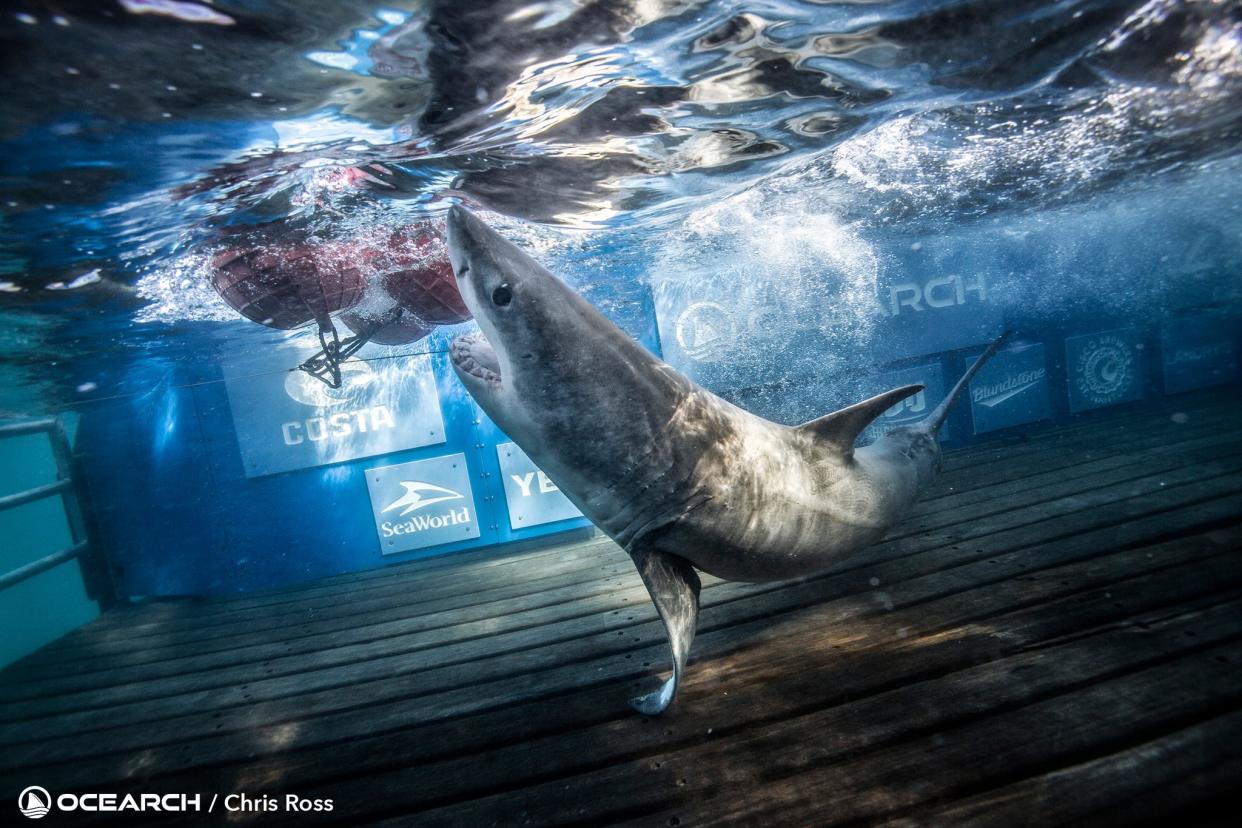8-foot great white shark pings off Florida twice in one week, near Jacksonville, Jupiter Island
Hello, Jekyll!
The 8-foot 8-inch great white shark, tagged by the nonprofit research group OCEARCH, pinged off Jupiter Island at 1:27 p.m Wednesday.
A ping means the satellite tag attached to the shark's dorsal fin broke the water's surface long enough to transmit location information.
Jekyll previously pinged off Jacksonville's coast on the morning of Feb. 4. He's traveled 7,152 miles since OCEARCH tagged him off Jekyll Island, Georgia in December 2022.
The juvenile white shark surprised scientists when they discovered it had been traveling for 4,000 miles alongside a 9-foot white shark named Simon. White sharks were previously thought to prefer only solitude.
But Jekyll and Simon may have parted ways. Simon's tracker shows his last ping in the Gulf of Mexico off Marco Island on Feb. 4. On Jan. 20, Jekyll pinged off South Carolina less than a day before Simon was tracked off Florida's Treasure Coast.
Here's what to know about Jekyll, OCEARCH and white sharks in Florida.

More about great white shark Jekyll
Jekyll was considered a juvenile shark when he was tagged by OCEARCH in December 2022 near Jekyll Island, Georgia. He was 8 foot 8 inches long and weighed 395 pounds.
"Jekyll is our 87th white shark tagged in the Western North Atlantic and our 3rd during Expedition Southbound! He was named by OCEARCH’s community in honor of Jekyll Island, Georgia near where we met him," his OCEARCH tracker page notes.
How big can great white sharks get?
White sharks can grow up to 20 feet long, though most are smaller with males averaging 11-13 feet.
Why are great white sharks in Florida?
White sharks swim south when the water gets too cold for them and they lack food sources up north, according to OCEARCH chief scientist Dr. Bob Hueter.
Think of them as the snowbirds of sharks.
Most of them tend to hang out away from the beaches in the continental shelf waters, Hueter said.
What is OCEARCH?
OCEARCH is a nonprofit organization researching the ocean's giants.
The group studies great white sharks and other keystone species essential for the health of the oceans.
OCEARCH recently finished up its 46th expedition, dubbed Expedition Southeast. It departed from Jacksonville on Nov. 17 and made its final docking in Morehead City, North Carolina on Dec. 15.
During the expeditions, researchers collected previously unattainable data on the animals' migrations, reproductive cycle, genetic status, diet, abundance, and more.
"If we lose the apex predator (sharks) then we lose all our fish and then there are no fish sandwiches for our grandchildren," OCEARCH founder Chris Fischer told the Courier Journal. "That's oversimplified, of course, but the idea is important because many shark species are threatened by overfishing and a demand for shark fins in Asia. Their dwindling numbers jeopardize ocean habitats."
Most shark attacks happen in Florida
There were 69 documented unprovoked shark attacks around the globe in 2023. The U.S. led the world with 36 attacks and Florida again was the state with the most bites at 16.
Florida shark attacks by county:
Brevard County: 2
Miami-Dade County: 1
Palm Beach County: 1
Escambia County: 1
Pinellas County: 1
While the U.S. has the most attacks, South Africa has the most shark-related fatalities.
Since 1992, there have been 1,232 shark bites worldwide, according to data from floridapanhandle.com, with white sharks credited as the top biters.
Support local journalism by subscribing to a Florida news organization.
This article originally appeared on Fort Myers News-Press: Florida sharks: Ocearch-tagged Jekyll pings off Jupiter Island
